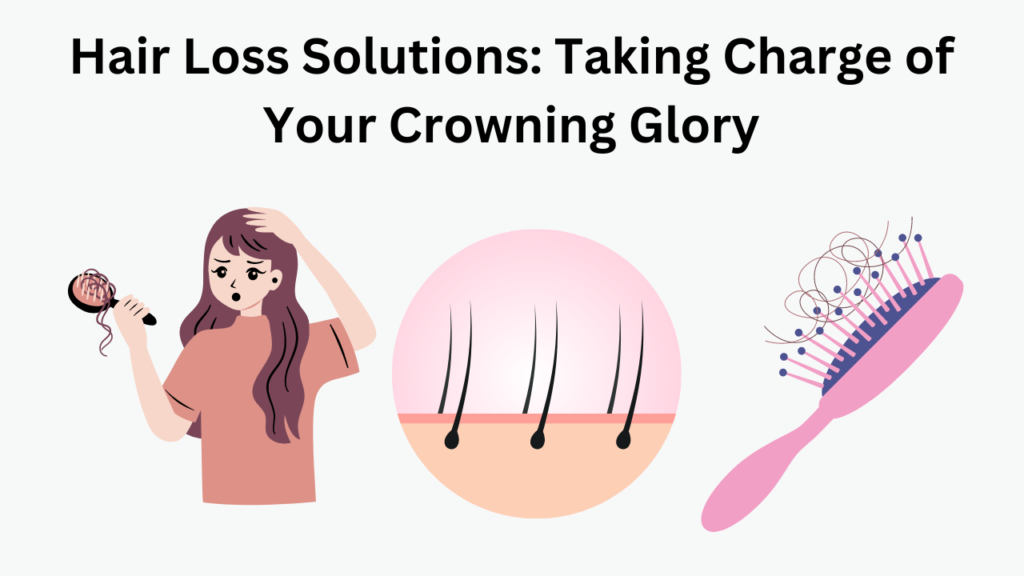Hair loss is a common concern for both men and women. It can be caused by various factors, from genetics to stress, and can significantly impact self-esteem. But the good news is there are steps you can take to slow down hair loss and even promote regrowth.

Understanding the Reasons Behind Hair Loss
The first step is identifying the culprit behind your thinning locks. Some of the most common causes include:
- Androgenic Alopecia (AGA): This hereditary condition is responsible for male pattern baldness and female pattern hair loss.
- Telogen Effluvium: This temporary hair loss can be triggered by stress, illness, childbirth, or significant weight changes.
- Medical Conditions: Certain medical conditions like thyroid disorders, iron deficiency, and scalp infections can also lead to hair loss.
- Medications: Some medications, such as chemotherapy drugs and blood thinners, can cause hair loss as a side effect.
- Hairstyles and Hair Care Practices: Tight hairstyles like braids or ponytails and harsh chemical treatments can damage hair and contribute to breakage and loss.
Taking Action to Regrow and Strengthen Hair
Once you understand the cause of your hair loss, you can explore treatment options. Here are some strategies to consider:
- Medications: Minoxidil (Rogaine) is a topical medication available over-the-counter, while finasteride (Propecia) is a prescription medication used to treat male pattern baldness. Both work by stimulating hair growth and slowing down hair loss.
- Hair Transplant: This surgical procedure involves transplanting hair follicles from a donor area of the scalp to a balding area. It’s a permanent solution but can be expensive.
- Laser Hair Therapy: Low-level laser therapy is a non-surgical option that may promote hair growth by stimulating blood circulation in the scalp. While research is ongoing, it shows promise for some individuals.
- Lifestyle Changes: Managing stress, getting enough sleep, and eating a healthy diet rich in essential nutrients can all contribute to healthier hair growth. Ensure you’re getting enough protein, iron, and vitamins like biotin and vitamin D, which are crucial for hair health.
- Gentle Hair Care: Be gentle with your hair. Wash it with a mild shampoo and avoid harsh styling products. Opt for loose hairstyles and minimize heat styling whenever possible.
- Scalp Care: A healthy scalp promotes healthy hair growth. Regularly massage your scalp to improve circulation and consider using a scalp scrub to remove dead skin cells and product buildup.
Consulting a Dermatologist
A dermatologist can diagnose the underlying cause of your hair loss and recommend the most appropriate treatment plan. They can also address any scalp conditions that may be contributing to hair loss.
Remember:
- Consistency is Key: Most hair loss treatments take time to show results, so be patient and consistent with your chosen approach.
- Realistic Expectations: It’s important to have realistic expectations. While some treatments can promote hair regrowth, complete reversal of hair loss may not always be possible.
- Early Intervention is Best: The sooner you address hair loss, the better the chances of successfully slowing it down and promoting regrowth.
Taking Action to Regrow and Strengthen Hair
Once you understand the cause of your hair loss, you can explore treatment options. Here are some strategies to consider:
- Medications: Minoxidil (Rogaine) is a topical medication available over-the-counter, while finasteride (Propecia) is a prescription medication used to treat male pattern baldness. Both work by stimulating hair growth and slowing down hair loss.
- Hair Transplant: This surgical procedure involves transplanting hair follicles from a donor area of the scalp to a balding area. It’s a permanent solution but can be expensive.
- Laser Hair Therapy: Low-level laser therapy is a non-surgical option that may promote hair growth by stimulating blood circulation in the scalp. While research is ongoing, it shows promise for some individuals.
- Lifestyle Changes: Managing stress, getting enough sleep, and eating a healthy diet rich in essential nutrients can all contribute to healthier hair growth. Ensure you’re getting enough protein, iron, and vitamins like biotin and vitamin D, which are crucial for hair health.
- Gentle Hair Care: Be gentle with your hair. Wash it with a mild shampoo and avoid harsh styling products. Opt for loose hairstyles and minimize heat styling whenever possible.
- Scalp Care: A healthy scalp promotes healthy hair growth. Regularly massage your scalp to improve circulation and consider using a scalp scrub to remove dead skin cells and product buildup.
Consulting a Dermatologist
A dermatologist can diagnose the underlying cause of your hair loss and recommend the most appropriate treatment plan. They can also address any scalp conditions that may be contributing to hair loss.
- Consistency is Key: Most hair loss treatments take time to show results, so be patient and consistent with your chosen approach.
- Realistic Expectations: It’s important to have realistic expectations. While some treatments can promote hair regrowth, complete reversal of hair loss may not always be possible.
- Early Intervention is Best: The sooner you address hair loss, the better the chances of successfully slowing it down and promoting regrowth.
